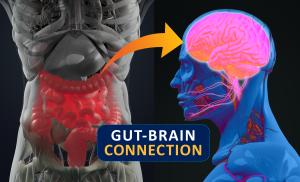
Article 4 (15/10/2025)
Gut and Brain Health: The Crucial Connection
The intricate relationship between gut health and brain health has gained significant attention in recent years, establishing itself as a vital area of research within the fields of nutrition and mental wellness. Recognizing this connection, Keystone Therapy has announced the launch of its Integrated Gut Health, Nutrition, and Mental Health Services. This initiative not only reflects advancements in mental health treatment but also emphasizes the transformative power of quality gut health on cognitive function and emotional well-being.
The gut-brain axis is a bidirectional communication network linking the gastrointestinal system and the brain. This complex relationship operates through various pathways. Understanding these connections is crucial for effective treatment strategies, especially for those suffering from mood disorders, anxiety, and other mental health issues.
Recognizing the vital link between gut and brain health, Keystone Therapy is pioneering integrated approaches that combine nutritional counselling with mental health support. Here are some foundational elements:
- Dietary Guidance: Tailored nutritional plans focusing on whole foods, probiotics, and prebiotics can foster a healthier gut microbiome.
- Mental Health Support: Concurrent therapy sessions addressing emotional and psychological challenges can enhance overall treatment effectiveness.
- Holistic Assessments: Comprehensive evaluations consider both dietary habits and mental health history for a personalized treatment approach.
Numerous studies have established the link between gut health and brain function. For instance, research published in the journal Nature Reviews Neuroscience highlights how gut-derived metabolites can influence brain activity and behaviour. Additionally, a meta-analysis in Psychosomatic Medicine found a strong correlation between dietary patterns and mental health outcomes. This growing body of evidence informs Keystone Therapy’s approach by ensuring that treatments are evidence-based and tailored to individual needs.
The relationship between gut health and brain health is a fascinating area that continues to unfold, shedding light on how our physical well-being can profoundly affect our mental wellness. Keystone Therapy’s launch of Integrated Gut Health, Nutrition, and Mental Health Services is a timely and essential step toward providing holistic care that addresses both dimensions. By fostering collaboration between nutrition and mental health professionals, we can better support individuals on their journey toward improved mental clarity and emotional resilience. As research evolves, it is imperative to remain informed and proactive about our dietary choices, recognizing their far-reaching impact on our mental health landscape.

Article 3 (05/12/2024)
Memory reconsolidation is a neurobiological process that involves the modification and re-storage of existing memories. When a memory is recalled or “reactivated,” it becomes susceptible to change before it is stored again in the brain. This process, known as reconsolidation, has significant implications for therapeutic interventions, particularly in the treatment of trauma.
How Memory Reconsolidation Works
When a traumatic event occurs, the brain forms a strong memory of the event, including the associated emotions and physical sensations. This memory is initially stored in the hippocampus, a region of the brain responsible for memory formation. Over time, the memory is transferred to the cortex, where it is stored more permanently. However, when a traumatic memory is reactivated, it becomes unstable and vulnerable to change. This is where reconsolidation comes into play.
Memory Reconsolidation in Trauma Treatment
By understanding the process of memory reconsolidation, therapists can develop new approaches to treating trauma. One promising technique is called reconsolidation interference. This involves reactivating the traumatic memory in a safe and controlled environment, and then interfering with the reconsolidation process. This can be done through a variety of methods, including:
- Medication: Beta-blockers, such as propranolol, have been shown to reduce the emotional intensity of traumatic memories when administered during reactivation.
- Psychotherapy: Techniques like exposure therapy and cognitive-behavioral therapy can help individuals gradually confront their traumatic memories in a safe and supportive environment.
- Virtual reality: Virtual reality exposure therapy allows individuals to re-experience traumatic events in a controlled virtual environment, which can help to reduce the emotional impact of the memory.
Potential Benefits of Memory Reconsolidation Therapy
Memory reconsolidation therapy offers several potential benefits for individuals suffering from trauma:
- Reduced emotional intensity: By interfering with the reconsolidation process, it may be possible to reduce the emotional intensity associated with traumatic memories.
- Improved coping mechanisms: Therapy can help individuals develop healthier coping mechanisms for dealing with trauma.
- Reduced avoidance behaviors: By confronting their traumatic memories in a safe and controlled environment, individuals may be able to reduce avoidance behaviors and live more fulfilling lives.
Limitations and Future Directions
While memory reconsolidation therapy shows promise, it is still a relatively new field of research. More research is needed to fully understand the mechanisms underlying this process and to determine the optimal treatment approaches. Additionally, it is important to note that memory reconsolidation therapy is not appropriate for everyone, and it should only be undertaken under the guidance of a qualified mental health professional.
If you are struggling with the effects of trauma, please seek professional help. A mental health professional can provide you with the support and guidance you need to heal and recover.

Article 2 (12/11/2024)
Understanding Behavioural Epigenetics: How Our Genes and Environment Interact
Introduction
In the realm of genetics, the study of how our behaviour is shaped by both genetic and environmental factors has opened up new avenues of understanding. Behavioural epigenetics is a burgeoning field that explores how gene expression is regulated without altering the underlying DNA sequence. This intricate interplay between our genes, environment, and behaviour has significant implications for psychology, health, and disease. Through this article, we will delve into the fundamentals of behavioural epigenetics, highlighting its mechanisms, implications, and future directions for research.
What is Behavioural Epigenetics?
At its core, behavioural epigenetics is the study of how genetic expression can be influenced by environmental factors. Unlike traditional genetics, which focuses solely on the DNA sequence, epigenetics investigates the chemical modifications that affect gene activity. These modifications can take various forms, including:
- DNA Methylation: The addition of methyl groups to DNA, typically silencing gene expression.
- Histone Modification: Changes to the proteins around which DNA is wrapped, influencing gene accessibility.
- Non-Coding RNAs: Molecules that play a role in regulating gene expression without encoding proteins.
These epigenetic changes can occur throughout an individual’s life and are influenced by a variety of external factors, including lifestyle, diet, stress, and exposure to toxins.
The Interplay Between Environment and Behaviour
One of the most compelling aspects of behavioural epigenetics is how environmental factors can induce changes in behaviour through epigenetic mechanisms. Research has shown that experiences during critical developmental periods can have lasting effects on gene expression. For instance:
- Stress: Exposure to chronic stress during early life can lead to alterations in the epigenetic landscape, potentially predisposing individuals to anxiety and depression.
- Nutrition: Maternal nutrition during pregnancy has been linked to the epigenetic regulation of genes associated with metabolic diseases in offspring.
- Social Environment: Positive social interactions can enhance gene expression related to brain development and emotional regulation.
These examples illustrate that our behaviour is not only a product of our genetic makeup but also significantly shaped by our experiences and environment.
Implications for Mental Health and Disease
The insights gained from behavioural epigenetics carry substantial implications for mental health and disease prevention. By understanding the epigenetic factors that contribute to psychological conditions, researchers may find new avenues for treatment and intervention. Some potential implications include:
- Personalized Medicine: Treatments could become more targeted based on an individual’s epigenetic profile, allowing for customized therapies that address specific behavioural issues.
- Preventive Strategies: Identifying individuals at risk for epigenetically influenced conditions may lead to timely preventive measures, such as lifestyle changes or early interventions.
- Research Opportunities: Currently, there is a strong need for additional research to uncover the specific epigenetic modifications linked to various psychological disorders.
Future Directions in Behavioural Epigenetics
The field of behavioural epigenetics is still in its infancy, and future research is expected to yield even more exciting findings. Some potential areas of exploration include:
- Longitudinal Studies: Following individuals over time to assess how environmental changes affect long-term epigenetic modifications and behaviours.
- Animal Models: Utilizing animal models to better understand the precise mechanisms of epigenetic changes and their behavioural outcomes.
- Therapeutic Approaches: Investigating drugs or lifestyle interventions that could induce positive epigenetic changes conducive to mental health.
As scientists continue to unravel the complexities of behavioural epigenetics, we may gain deeper insights into how to optimize well-being and mitigate the effects of adverse experiences.
Conclusion
Behavioural epigenetics offers a groundbreaking perspective on the intricate relationship between our genes and behaviour. Understanding how environmental factors can alter gene expression without changing the DNA sequence itself has significant implications for mental health and disease prevention. As research in this field continues to evolve, it holds the promise of developing innovative approaches to understand and potentially intervene in the pathways that shape our behaviour. Through continued exploration, we may discover that the key to our future well-being lies not only in our genes but also in the environments we cultivate and the experiences we share.
—————

Article 1 (26/10/2024)
Are Instincts Important in Our Lives?
Human behaviour has often been a subject of fascination and inquiry. Among the many factors that drive our actions and reactions, instincts stand out as a fundamental aspect of our psychology. These innate tendencies influence various dimensions of our existence, including decision-making, relationships, and survival. Understanding these instinctive behaviours and their relevance can provide significant insights, especially in the context of our interpersonal relationships. This article explores the importance of instincts in our lives and their potential role in enhancing our relationships.
Understanding Instincts
What Are Instincts?
Instincts are defined as the inborn patterns of behaviour that are innate to every individual, often guiding actions without the need for conscious reasoning. They manifest as automatic responses to certain stimuli and can be seen across various species in the animal kingdom, including humans. Instincts shape how we interact with the world, influencing emotions, decisions, and social behaviours.
The Role of Instincts in Human Behaviour
- Survival Mechanism: Evolutionarily speaking, instincts have played a crucial role in human survival. Instinctive behaviours’ such as fight or flight responses help individuals react swiftly in danger, ensuring their safety.
- Social Interactions: Our instinctual drives, such as the need for belonging and affection, underpin social bonds. These intrinsic inclinations guide us in forming relationships, communicating, and creating connections with others.
- Decision Making: Instincts often influence our choices and judgments. Sometimes, our gut feelings or “intuition” can lead to sound decisions and serve as a quick guide in uncertain situations.
Harnessing Instinct for Relationship Improvement
Identifying Instinctive Behaviours
Understanding how instincts manifest in our relationships can be the first step toward improvement. Common instinctive behaviours that influence relationships include:
- Trust: Instinctively, individuals tend to seek trustworthiness in their relationships. This foundational instinct is crucial for fostering deeper connections.
- Empathy: The inherent ability to empathize with others is instinctive and allows for emotional resonance, which is key for nurturing relationships.
- Attachment: Instincts drive us to bond with significant others, family members, and even close friends. Recognizing these attachment instincts can guide how we deepen our connections with others.
Using Instincts to Enhance Relationships
To leverage instinctive behaviour for relationship enhancement, consider the following strategies:
- Develop Trust: Foster an environment where trust can flourish. This can include consistent communication, fulfilling promises, and being open and honest with one another.
- Practice Empathy: Regularly practice active listening. Make a conscious effort to understand and validate the feelings and experiences of those around you.
- Cultivate Attachment: Engage in activities that reinforce your bonds with loved ones. Shared experiences, whether through shared hobbies, travel, or simple family dinners, can strengthen attachment instincts.
- Learn to Read Instincts: Pay attention to both your instincts and those of others. Recognizing the instinctual cues of your partner or friends can enhance understanding and reduce conflicts.
The Balance Between Instinct and Reason
While instincts are undoubtedly significant, balancing them with reasoning and judgment is essential. It can be easy to act solely on instinct; however, integrating thoughtful decision-making can lead to healthier and more rewarding relationships. Some points to consider include:
- Reflect Before Reacting: Instincts often lead to knee-jerk reactions. Taking a moment for reflection can allow for a more measured response.
- Evaluate Relationships: Assess whether instinct-driven connections are genuinely beneficial. Sometimes, natural instincts can lead us toward toxic relationships that need re-evaluation.
- Seek Support: In cases where instinctual behaviour leads to negative patterns, consider seeking professional guidance or counselling to understand and change these behaviours.
Conclusion
In summary, instincts play a vital role in shaping our lives and relationships. By recognizing and embracing our instinctual behaviours, we can enhance trust, empathy, and attachment, crucial elements for fulfilling and meaningful interactions. However, it’s equally important to balance these instincts with reason and reflection to navigate relationships effectively. Understanding and leveraging our instincts can lead to personal growth and stronger connections, ultimately enriching our lives in profound ways. As we move forward, we must continue to explore the intricate relationship between instinct and reason, ensuring that our instincts serve as a guiding light rather than a blind compass in navigating the complex landscape of human relationships.


